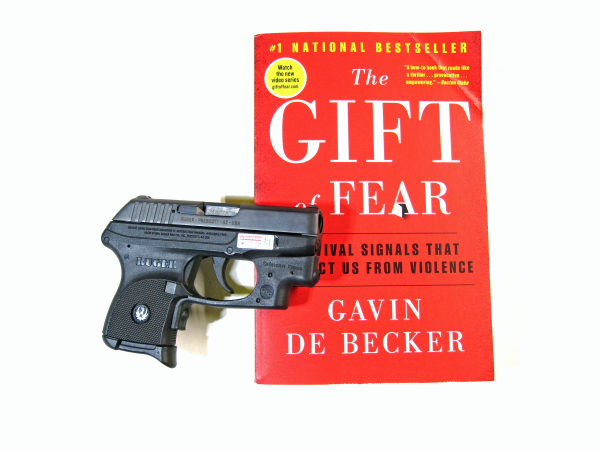“Fortuitous outcomes reinforce bad decisions and poor tactics.” – Chuck Haggard
“Just because something worked once doesn't mean it should be policy.” – Rich Grassi
-- or --
"Just because something's possible, doesn't mean it's a good idea." -- James Lindell
Trying to learn from events reported in media is fraught with problems. News reports are famous for inaccuracy and lack of detail. You must be aware of Gell Mann Amnesia. A term coined by Michael Crichton, it refers to our tendency to despair of accuracy in reporting when reading-seeing-hearing a story in an area in which you have expertise or personal knowledge – followed by another story from the same service in which you note “I can see that happening.”
 The accuracy/detail is variable, but a serious issue is one of credibility; if the service is wrong about one story, how can you believe the other? And if you do buy it, just because something happened once in close range interpersonal conflict, what are the chances the same thing will happen again?
The accuracy/detail is variable, but a serious issue is one of credibility; if the service is wrong about one story, how can you believe the other? And if you do buy it, just because something happened once in close range interpersonal conflict, what are the chances the same thing will happen again?Still, the situations people face can be categorized. And, even if the story has part of it wrong, I imagine you can infer that such scenarios can happen. You can’t anticipate every potential problem, but some things tend to occur in a recurring fashion. It’s perfectly appropriate to examine the story and consider what if? – “war gaming” the preparation and responses to such situations.
Stephen Wenger aggregates these “defensive uses of firearms” on his mailing list. It’s valuable to consider the stories, including that grain of salt. Plus, Stephen’s parenthetical comments contain compelling analysis.
He breaks the stories down by venue. One is “vehicular.” This is becoming a common locale for negative encounters. For example, in Chicago, a 47-year-old man was inside his car and a group of four “jumped him and demanded his car.” One of the perps “(discharged) a chemical agent” – unnamed – on the victim. The victim shot at the suspects. One of them, 16 years old, was hospitalized with gunshot injuries in a knee and arm. The remaining perps took the car. This occurred at around 5:20 a.m., just hours after a retired police officer in the same city “shot a suspected vehicle thief” – about which there’s no other information.
It seems that keeping ones’ doors locked while in an automobile can help as well as maintaining an interval distance between your vehicle and the one in front, in case you need to move. It’s not the whole solution, but it’s a start.
In his residential category, we have “home invasions – domestic” and “home invasions – other.” In one, there was a report of “criminal mischief and assault” to which officers responded. During the response, there were 911 calls of shots fired at the location. The home invader, who was armed, had reportedly broken into the residence where he strangled a woman. A third party attempted to intervene, but when the perp threatened to stab the woman, he was shot by the person attempting to help the victim.
In a California case, an apparent intruder attempting to forcibly enter a residence was shot. He is expected to survive and the armed citizen was “detained on the scene.” He was cooperating in the investigation and the police said the victim was “not in custody.”
An “ex-boyfriend” was fatally shot when he was allegedly breaking into her home in another case – this one with some details. The ex, not a lawful resident of the location, was constrained by a domestic violence order of protection from being in contact with the victim.
The victim, armed with a 380 pistol, fired five rounds which yielded five hits on the suspect. We don’t know where the bullets landed, but the victim-offender won’t be telling us as he didn’t survive.
A few things to keep in mind, we’ll start with the easy one: we’re seen by others in light of the people with whom we associate. In these domestic events, there’s no way to tell if there were bad decisions made by the victim which led to the negative outcomes. Personal associations are something to carefully consider. Better to be lonely than end up in a potentially life-ending event.
Next, the victims in these cases shot at people who apparently were actively acting in criminal (and criminally dangerous) ways; sometimes that “bump in the night” isn’t the “ex,” or a violent felon – but someone who has a lawful right to be there. Shedding a bit of light on the situation helps with decision-making.
An associate was castigated for having a light on his pistol. “That will give away your position,” he was told. Funny, he said. I thought the gunfire might be a giveaway.
Having a light switch on the wall helps too; or just saying “who’s there?”
One more thing – the case with the 380 pistol; the gun and the wielder both worked to stop the threat. You may opine that something bigger is better and begin circular discussions, none of which matter.
She went five-for-five. Enough said.
It pays to be careful when looking at “news.” An advantage is that even if the reporters get it wrong, you still have something to think about.
— Rich Grassi
